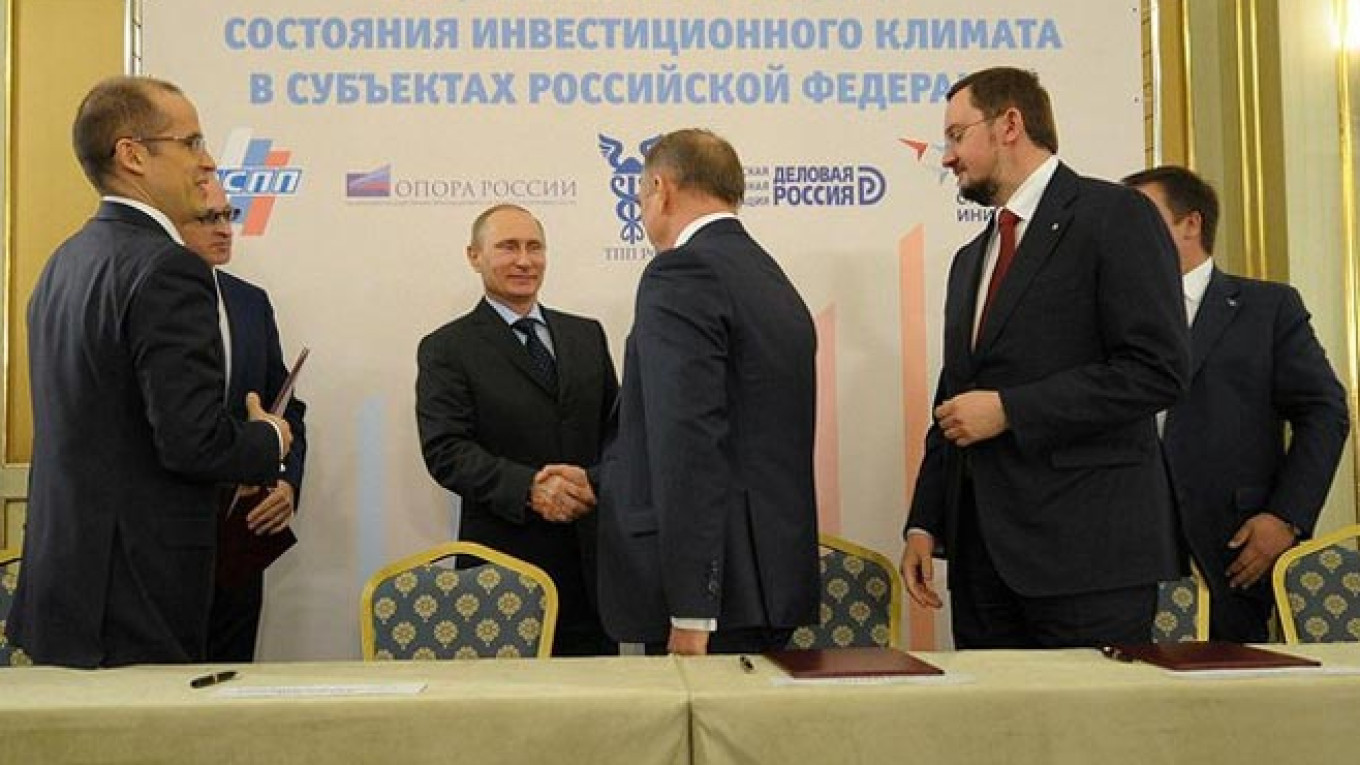President Vladimir Putin on Thursday demanded that Russian business leaders register their companies onshore, rather than in foreign tax havens.
He made the statement at a congress of leading business owners, the Russian Union of Industrialists and Entrepreneurs, also known by its Russian acronym, RSPP.
"Russian companies must be registered in our homeland," he said, according to a transcript of his speech posted on the Kremlin's website. "I am sure that you are also interested in this."
Putin has made a point of pulling companies onshore, in a bid to increase the government's tax take, since he returned to the presidency in May 2012. The call has gained new urgency as the economy cools and budget revenues taper off.
Putin reiterated the message as talk continued in the West of ways to make Russia pay a price for its annexation of Ukraine's separatist region of Crimea.
The Finance Ministry proposed legislation earlier this week to tax foreign companies that have their founders and key assets in Russia, a bill that effectively discourages this type of ownership. A great deal of Russian billionaires — such as Vladimir Potanin, Vladimir Lisin and Roman Abramovich ?€” control their holdings here through investment vehicles registered in Cyprus and other tax havens.
Putin promised in his speech on Thursday that the push for domestic registrations would come with efforts by the government to improve the conditions for business at home, such as stronger guarantees of property rights and rule of law.
In addition, if companies pay more of their taxes at home and do not "dodge their responsibility to the country," they will increase trust in business and the values of economic freedom, he said.
Finance Minister Anton Siluanov, speaking at the same conference, said the government would bail out the country's key companies, should they fall on hard times amid the flagging economic growth. He warned, however, that a lack of financial resources meant that the support would not cover as many businesses as it did during the meltdown of 2008 and 2009.
"We do not want to be helping company owners all the time," he said.
Russia's gold and currency reserves now stand at $494 billion, being the world's fifth-largest, but $100 billion short of the amount available in 2008. The government then supported industrial giant like automaker AvtoVAZ and aluminum producer RusAl.
Siluanov also said he supported the idea for the country's development bank, VEB, to set up a special fund to lend money for major industrial projects at a lower-than-usual interest.
Industry and Trade Minister Denis Manturov said Wednesday that the fund could charge no more than 5 percent on its loans, about half the average rate.
Contact the author at [email protected]
A Message from The Moscow Times:
Dear readers,
We are facing unprecedented challenges. Russia's Prosecutor General's Office has designated The Moscow Times as an "undesirable" organization, criminalizing our work and putting our staff at risk of prosecution. This follows our earlier unjust labeling as a "foreign agent."
These actions are direct attempts to silence independent journalism in Russia. The authorities claim our work "discredits the decisions of the Russian leadership." We see things differently: we strive to provide accurate, unbiased reporting on Russia.
We, the journalists of The Moscow Times, refuse to be silenced. But to continue our work, we need your help.
Your support, no matter how small, makes a world of difference. If you can, please support us monthly starting from just $2. It's quick to set up, and every contribution makes a significant impact.
By supporting The Moscow Times, you're defending open, independent journalism in the face of repression. Thank you for standing with us.
Remind me later.


